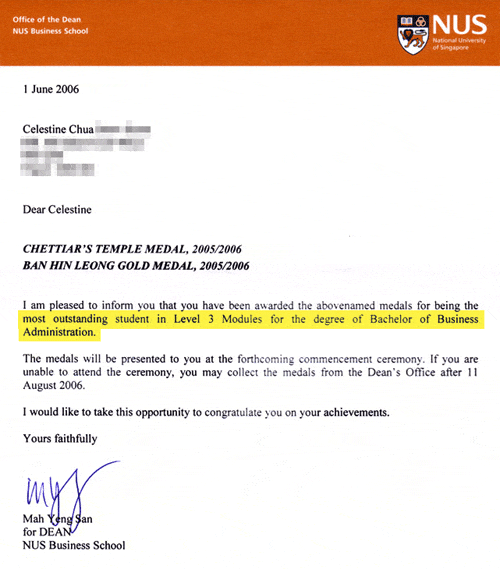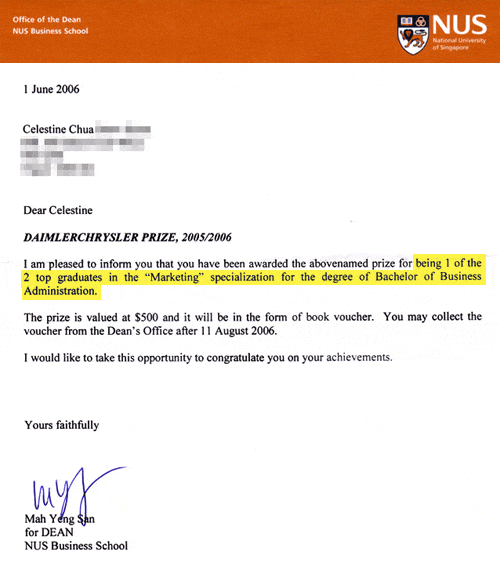This is part 1 of a 3-part series on how to get on the Dean’s List and score top academic results.
- Part 1: What is the Dean’s List and 6 Benefits of Being on the Dean’s List
- Part 2: How To Get On the Dean’s List: Tips #1-6
- Part 3: How To Get On the Dean’s List: Tips #7-13

Recently I noticed that there are many students who read this blog. So I figured that I should write a post on how to get on the dean’s list. This post will be beneficial for any student, not just university students, as it’s about achieving academic excellence.
Even if you’re reading this as a second- or third-year student, you can still use the tips for your remaining semesters and graduate with a high grade point average. :)
What is a Dean’s List?
Dean’s List should be a familiar term to university students and graduates.
A Dean’s List is an academic award, or notation, used to recognize the level of high scholarship demonstrated by students in a college or university. It is often synonymous with honor roll and honor list, but should not be confused with honours degrees.
Generally, students enrolled in college or university would need to satisfy a series of specific requirements before receiving the Dean’s List. These requirements may differ across institutions, but in most cases will require students to enroll in a full-time capacity, to achieve a specific grade point average within the academic term, and to maintain a specific cumulative grade point average throughout enrollment.[1]
Dean’s List is an honor roll assigned to the top students. As the Dean’s List is awarded to the top few percentile of students, the GPA cut-off to get onto the list varies across faculties and semesters. In general, your GPA has to be minimum 3.6/4.0 or 4.5/5.0 (average of A- and A for all subjects) to be considered for the Dean’s List. If it is a highly competitive semester where everyone scored very well, the cut-off will be higher.
(For those of you in the United States, your college grade point (GPA) is based on a total of 4.0. In Singapore, the universities use Cumulative Average Point (CAP) which is based on a total of 5.0. For the rest of this series, I’ll refer to the CAP system which is based on 5.0 total score.)
When I was studying at the National University of Singapore, I was on the Dean’s List for all three academic years of my studies. There, the Dean’s List is awarded to the top five percent of students. The NUS Business School is a competitive faculty (it’s a leading business school in Singapore and the Asia Pacific region), with students from top junior colleges and scholars from the neighboring countries, so it was an accomplishment to be on the list. I graduated in 2006 as the top student in my specialization of Marketing, and was given awards for being the most outstanding student.

Being awarded with the Chettiar’s Temple Medal and Ban Hin Leong Gold Medal for being the most outstanding student

Being awarded with the Daimler Chrysler Prize as one of the 2 top graduates in Marketing
Looking back, university years were my favorite years in my entire two decades of education. I felt very stifled growing up as a kid in primary school, and the transition from each phase of the education system, all the way to university gave me increasing liberty as a student and a person. Thinking back, the Asian and Chinese culture greatly diminishes the worth of a child by virtue of their age, and I felt like a square in a round peg hole growing up. I felt like I was repeatedly being beaten to fit a mold in the Singapore education system, and I never knew what was going wrong until I was much older.
In my opinion, seniority and disciplinarian approaches — typical in the Chinese culture — do not bring out the best in students or people. Even though there is merit behind these approaches, it is only a short-term effect as these approaches are fear-based. In the long-term, they tend to stifle and suffocate. I share more here: Stop Shaming, Start Praising: What I Learned From Growing Up in a Shaming Culture
Why get on the Dean’s List?
There are benefits from being on the Dean’s List. Some are important benefits, while some are fringe benefits. As a disclaimer, these are benefits that I experienced as a business student during my time in university (2003-2006). They may not apply to other universities or faculties or time periods, though I don’t think they would differ much.
6 Benefits to Get on the Dean’s List
- A sense of personal achievement. The most important reason in my opinion. Getting on the Dean’s List is a great personal achievement. The Dean’s List is not awarded based on absolute GPA score — it’s awarded based on comparative performance with everyone else in the faculty. This means if all your peers are top scorers, you have to score even better qualify for the Dean’s List. Being on the Dean’s List means that you are among the top 1-5% of the faculty in terms of academic results.
- Increasing your employability factor. Ultimately we study to get a good job — our best possible job. While results are not the sole determinant to get a good job (there are other factors like your leadership activities, your personality fit with the company, etc.), your GPA is highly important, especially for top jobs with Fortune 100 companies. Many top employers use GPA as a preliminary criteria to shortlist candidates during campus recruitment, though there are exceptions if you have a strong portfolio and strong leadership involvement in core curricular activities.
- Invitation to special events. Since you are among the top in your cohort, you’ll be invited to special events. The most common being networking events with companies executives, usually top companies — the ones you may want to join. During my university years, I was often invited to inner-circle networking events and talks. Of the ones I went to, I only found some of practical use – but it’s always good to attend and meet new people. There are also international case competitions, where participation is generally on an invitation basis. And students get invited if they are on the Dean’s List.
- Exclusive access to top employers. Top companies often hold recruitment events on campus. There are the recruitment seminars for the student cohort, and then there are exclusive networking sessions for selected students. The HR in top companies commonly request the Dean’s Office to invite students that have a minimum GPA of X.XX. Examples are Procter & Gamble (my ex-company), McKinsey, investment banks, and consulting firms.
- Being on the Dean Office’s radar. When you are on the Dean’s List, people in the dean’s office and university career office tend to know you. After all, there are hundreds of students in the faculty, and only a small handful are on the Dean’s List. This is useful for random situations, say when you want to get the inside scope on what’s going on, information on upcoming events, or just to have someone to talk to about university matters.
- Prestige and recognition. If all the special invitations and inclusion for exclusive events aren’t enough, being on the Dean’s List is pretty much synonymous with intellectually smarts and academic success. As the board would put up the names of people on the Dean’s List on the university website and on school notice board, students who read it generally know who you are, at least by name. During my time, people generally speak of those on the Dean’s List with a certain awe and respect.
While it was exciting being on the Dean’s List back in university, don’t associate it as part of your identity. At the end of the day, this is an external achievement like everything else in life — your car, clothes, material possessions, property — and they will shed away one day when you die. The most important thing is to recognize this as a form of personal achievement, and that being on the Dean’s List is a means to help you with other goals in life, such as employability and career success. Don’t attach yourself to external achievements, but your intrinsic values and mission in life.
Continue on to the next part, where I share tips to get on the Dean’s List. Read: How To Get On the Dean’s List – Part 2
This is part 1 of my 3-part series on how to get on the Dean’s List.







 I hope you find my content helpful. Join my community of 65,000 readers and get my latest articles delivered to your inbox. Your email is safe and I never send spam.
I hope you find my content helpful. Join my community of 65,000 readers and get my latest articles delivered to your inbox. Your email is safe and I never send spam.
hi celes, it’s my first time to visit your blog and i found it very interseting, all the tips and advices you are giving to your readers are sincere, especially this one. I also was a dean’s lister and luckily, it helped me become confident looking for the best jobs around. I was quite disappointed before that after my undergrad graduation I was stucked for nine months, had difficulty landing a job related to my course. Fortunately, after patiently waiting and perseverance, I am happily contented with my work now (though of course aiming still for something). I am proud that I became a dean’s lister, as you’ve said, it has a positive impact to employers.
Cheers from the Philippines – I am glad that I found your blog, I’m also a blogger of http://dhina-lieva.com, yet sometimes, I run out of ideas and topics to post.
Keep it up! God bless you :-)
I would add, though, that being on the Dean’s List will NOT necessarily get you a job, and that internships are extremely important. I was on the Dean’s List many times as an undergrad, graduated magna cum laude and with general Honors, which I was assured was a Big Deal at my school. I went on to graduate with high distinction from one of the top 25 law schools in the country, with a whole pile of prestigious awards. I graduated a year ago and have been looking for nonprofit and government jobs ever since. In a month, I’m going to have to apply to Starbucks and it’s one of the most depressing, personally defeating things I’ve had to do. So, my advice to students: do those internships. Don’t take summer classes, get an internship. Otherwise, you’ll get passed over despite how great your academic resume looks.
Judith-
As a fellow Attorney, I understand your disappointment. Before you apply to Starbucks try to get work as a Contract Attorney. It pays slightly more than Starbucks. Take a look at this article. It states that your experience is not an isolated incident. Good Luck with the job hunt.
http://finance.yahoo.com/career-work/article/109478/bar-raised-for-law-grad-jobs?mod=career-work
Hey Judith, I’m sorry to hear about your predicament. I agree that strong academic results doesn’t automatically grant a great job (or a job for that matter, in a competitive or poor performing industry). I’d say it best functions as a first level filter for companies and is only 1 of the many filters. I have friends who are learning as well in the hard way, having focused more on academics and not equipping themselves in other aspects, and realizing afterward it was just part of the equation. In the end leadership experience and work experience are the crux. Some of my ex-colleagues didn’t have the top grades but they made up for it with their other experiences.
Commenting for this post is closed.